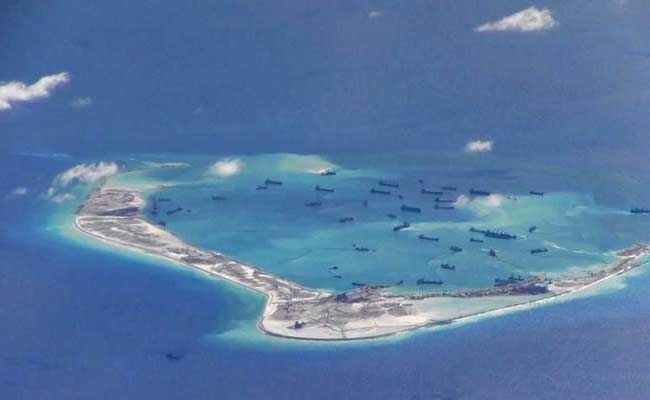
Chinese dredging vessels are purportedly seen in the waters around the disputed Spratly Islands in this still image from video taken by a Poseidon surveillance aircraft provided by the US Navy. (Reuters Photo)
Washington:
The United States has agreed with Singapore on a first deployment of the US P8 Poseidon spy plane in Singapore this month, in a fresh response to China over its pursuit of territorial claims in the South China Sea.
In a joint statement after a meeting in Washington on Monday, U.S. Defense Secretary Ash Carter and Singapore Defense Minister Ng Eng Hen welcomed the inaugural deployment of the aircraft in Singapore from Dec. 7 to 14.
A US defense official said further deployments in Singapore could be expected. The move comes at a time of heightened tensions in the South China Sea over China's assertive pursuit of territorial claims there.
The US deployment is likely to anger China, which is at odds with Washington over the South China Sea. China claims almost the entire energy-rich sea, through which more than $5 trillion of maritime trade passes each year.
The United States already operates P8s from Japan and the Philippines, and has also conducted surveillance flights from Singapore's neighbor, Malaysia.
The statement said the P8 deployment in Singapore would "promote greater interoperability with regional militaries through participation in bilateral and multilateral exercises, while providing timely support for regional HADR and maritime security efforts."
HADR is an acronym for Humanitarian and Disaster Relief operations.
The United States and Singapore have long-standing defense ties and the announcement of the P8 deployment was part of an enhanced Defense Cooperation Agreement signed by Carter and Ng, which also covers cooperation in fighting transnational terrorism and piracy.
Washington has criticized China's building of artificial islands in the South China Sea's disputed Spratly archipelago, and has conducted sea and air patrols near them recently.
Last month, US President Barack Obama called on countries to stop building artificial islands in the sea and militarizing their claims. He said the United States would continue to assert its freedom-of-navigation rights.
China responded by saying it would continue to build both military and civilian facilities on the islands.
Washington has been working to build up defense relationships with South China Sea rival claimants, which include Vietnam, the Philippines, Malaysia, Taiwan and Brunei.
Last month, US B-52 bombers flew near some of China's artificial islands and at the end of October a US guided-missile destroyer sailed within 12 nautical miles of one of them.
In May, the Chinese navy issued eight warnings to the crew of a US P8 that flew near the islands, according to CNN, which was aboard the US aircraft.
In a joint statement after a meeting in Washington on Monday, U.S. Defense Secretary Ash Carter and Singapore Defense Minister Ng Eng Hen welcomed the inaugural deployment of the aircraft in Singapore from Dec. 7 to 14.
A US defense official said further deployments in Singapore could be expected. The move comes at a time of heightened tensions in the South China Sea over China's assertive pursuit of territorial claims there.
The US deployment is likely to anger China, which is at odds with Washington over the South China Sea. China claims almost the entire energy-rich sea, through which more than $5 trillion of maritime trade passes each year.
The United States already operates P8s from Japan and the Philippines, and has also conducted surveillance flights from Singapore's neighbor, Malaysia.
The statement said the P8 deployment in Singapore would "promote greater interoperability with regional militaries through participation in bilateral and multilateral exercises, while providing timely support for regional HADR and maritime security efforts."
HADR is an acronym for Humanitarian and Disaster Relief operations.
The United States and Singapore have long-standing defense ties and the announcement of the P8 deployment was part of an enhanced Defense Cooperation Agreement signed by Carter and Ng, which also covers cooperation in fighting transnational terrorism and piracy.
Washington has criticized China's building of artificial islands in the South China Sea's disputed Spratly archipelago, and has conducted sea and air patrols near them recently.
Last month, US President Barack Obama called on countries to stop building artificial islands in the sea and militarizing their claims. He said the United States would continue to assert its freedom-of-navigation rights.
China responded by saying it would continue to build both military and civilian facilities on the islands.
Washington has been working to build up defense relationships with South China Sea rival claimants, which include Vietnam, the Philippines, Malaysia, Taiwan and Brunei.
Last month, US B-52 bombers flew near some of China's artificial islands and at the end of October a US guided-missile destroyer sailed within 12 nautical miles of one of them.
In May, the Chinese navy issued eight warnings to the crew of a US P8 that flew near the islands, according to CNN, which was aboard the US aircraft.
© Thomson Reuters 2015
Track Latest News Live on NDTV.com and get news updates from India and around the world

